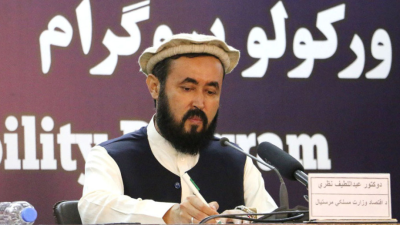Seeking international legitimacy, Taliban in Tokyo for talks
A Taliban delegation is in Tokyo to meet Japanese officials and discuss humanitarian assistance and possible investments, while the Japanese government reiterated the importance of respect for human rights. The talks, organised by a private institution, end this Sunday. Afghanistan’s opposition slammed the meeting with government officials.
Tokyo (AsiaNews/Agencies) – A Taliban delegation arrived in Japan on Sunday for talks with government officials and representatives of private organisations to obtain humanitarian aid and possibly re-establish diplomatic relations.
Yesterday, during one of the meetings (the visit will take up a week, until Sunday), Toshihide Ando, director-general of the Middle Eastern and African Affairs Bureau, Ministry of Foreign Affairs, urged Taliban representatives to respect human rights and start an inclusive political process.
This is the first visit by a Taliban delegation to Japan since the group regained control of Afghanistan after the withdrawal of US troops in August 2021.
For the Taliban, the talks are an attempt to gain greater international legitimacy, while Japan is trying to balance its diplomatic approach with a critical stance on the restrictions imposed by the Afghan regime on the civilian population.
The Taliban delegation, which includes Deputy Minister of the Economy Latif Nazari, came at the invitation of the Nippon Foundation, which is seeking “to have a broad perspective toward their future nation building,” while the Taliban government, still not officially recognised by any country, will “accept humanitarian assistance” for its people.
During the talks, Ando, who also serves as the ministry's special representative for Afghanistan, called on Afghan representatives to address “urgent priorities” such as respect for women's and children's rights.
Since their return to power, the Taliban have imposed severe restrictions on women, banning them from education, travel without a male companion, and limiting their access to work.
According to United Nations, almost 23 million people (about half of the Afghan population) will need humanitarian assistance in Afghanistan this year.
About 21 million people lack adequate water and sanitation, 14.8 million are severely food insecure, 14.3 million have limited access to health care, while 7.8 million women and children need food assistance.
Japan, along with countries like Russia and China, has kept its embassy in Kabul open, with the intention of maintaining a minimum level of communication with the Taliban.
Japan's cabinet secretary, Yoshimasa Hayashi, stressed that the delegation's visit was organised by a private institution, but acknowledged that it is part of the government's efforts to make Afghanistan a more stable and inclusive country.
For his part, Deputy Minister Latif Nazari, in a letter to Kyodo News, said that the Afghan people want "strong, friendly and deep relations with Japan", praising Tokyo for its position of non-interference in the country's internal affairs.
“Our request to the government of Japan is to further assist the people of Afghanistan” in areas such as education, health care and infrastructure.
The deputy minister also encouraged Japanese businesses to invest, saying, “Security has been ensured throughout the country, corruption has been eradicated, and a favourable environment for investors has been created.”
However, these statements are contradicted by reports of recent attacks carried out by the Islamic State group against Taliban officials, and the reports of international organisations on the human rights situation.
A few days ago, Japan’s embassy condemned a deadly suicide bombing outside the Ministry of Urban Development and Housing in Kabul, posting on X on Sunday that “these attacks of terror must cease immediately”.
The meeting between the Taliban and Japanese officials was severely criticised by the Afghanistan’s National Resistance Front (NRF), an opposition group loyal to the government deposed in 2021.
Abdullah Khenjani, head of the NRF political bureau, said that “the Afghan people felt so disappointed” by the Tokyo meeting. He urged Japan not to “gamble” its credibility by supporting, even indirectly, the Taliban government.
The NRF representative questioned the legitimacy of the visit, pointing out that, although it was formally organised by the Sasakawa Peace Foundation, issuing visas was still the responsibility of the Japanese government.
Khenjani spoke from Vienna, where he was taking part in a conference on democracy in Afghanistan, also attended by Ahmad Massoud, leader of the NRF and son of the late commander Ahmad Shah Massoud.
01/12/2022 18:37
06/09/2021 15:21







.png)










